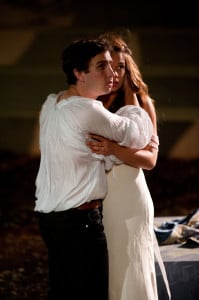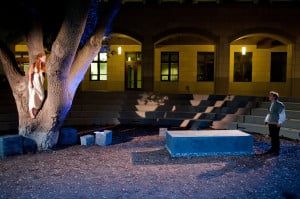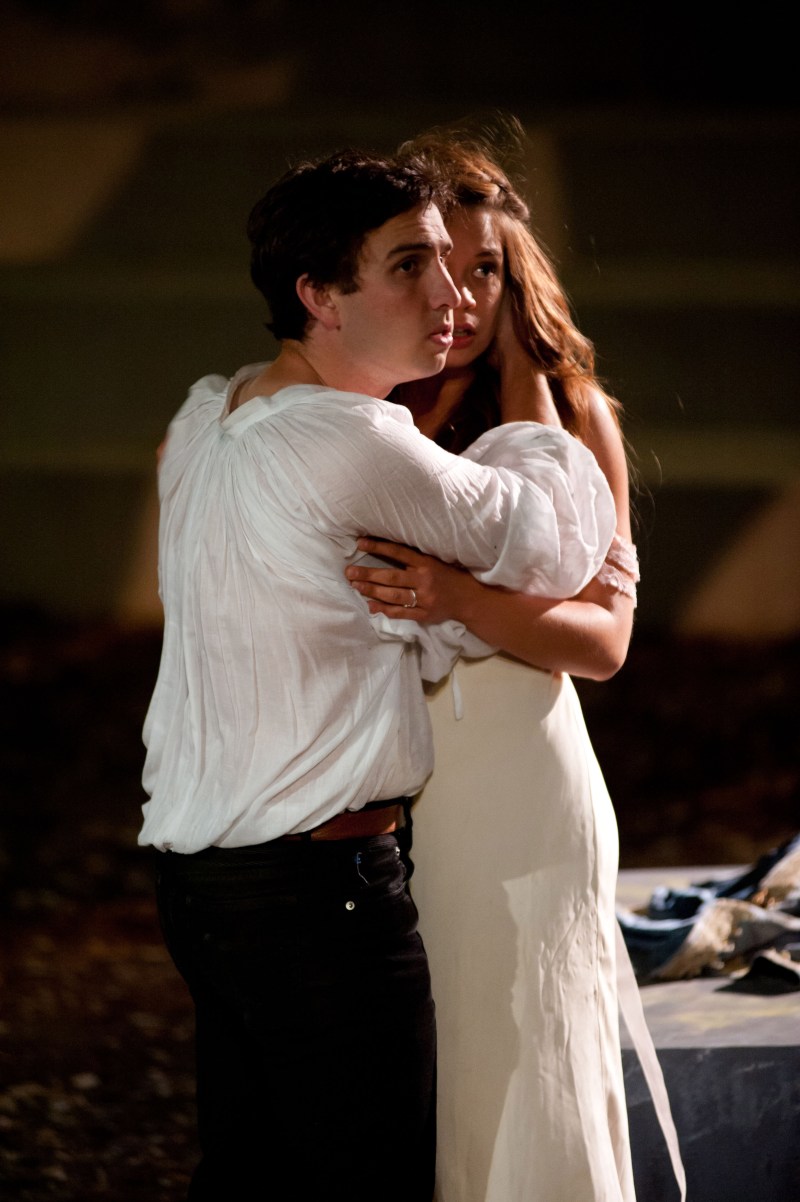
The Stanford Shakespeare Company traditionally stages its spring show outdoors, in scenic and visually interesting parts of campus. This year is no exception: The group mounts “Romeo and Juliet” in a small, sunken amphitheatre on the Engineering Quad, with a large tree bathed in violet lights as the centerpiece of the stage. The setting is intimate — the first ring of stone benches is level with the actors — and the players enter and exit from behind the audience.
The actors adapt well to a production in the round, making good use of the sparse scenery and the tree, which serves as Juliet’s (Camille Brown ’14) balcony in Act II, Scene 2. She and Romeo (Kevin Hurlbutt ’14) render this and other interactions with all the emotional fluctuation appropriate to a hormonal and eminently believable young couple. As Brown told The Daily, “Once I translated it into modern English — just for myself — it felt natural to become the character.” Brown’s Juliet is consistently relatable to anyone who remembers their high school years; she is impulsive and headstrong, the quintessential rebellious teenager in a restrictive household, whose infatuation with a boy she meets at a party becomes her whole world. Her best moments, however, are not the expected scenes of high passion; rather, Brown excels at internal conflict — her marriage vows, which follow several memorable bouts of self-doubt, are justly earned.
Hurlbutt’s Romeo, too, could be any brooding, lovelorn high schooler decked out in a blue doublet; he spends the majority of the play lamenting his romantic woes in a typical adolescent fashion, his melancholy punctuated by several soliloquies revealing a more impassioned inner character. Hurlbutt recounts developing Romeo’s internality with director Evan Dragic ’12, which involved “lots of looking at the text, talking about symbolism and all the little things [the audience doesn’t] notice.” This detailed examination shines through in several key scenes: the few minutes of animated panic in the Capulet garden, a moving reaction to the death of Mercutio (Mary Glen Fredrick ’12) and Romeo’s bitterness upon receiving word of his banishment, whereupon he lashes out at his friend and mentor, Friar Laurence (Francisco Maravilla ’12).
The play is not all tears; the company deftly captures the Bard’s sharp, often bawdy wit. The banter between Romeo and his sidekicks Mercutio and Benvolio (Mary Beth Corbett ’12) never fails to amuse, especially as they become more inebriated as the night progresses. Corbett’s stage presence is emphatic and precise, whereas Fredrick’s Mercutio is mercurial and animated, both providing contrast to the more sober Romeo. Juliet’s nurse (Insiya Jafferjee ’14) also manages to ease the tension among the Capulets as she flits about like a well-intentioned mother hen, offering equal parts comfort and unwelcome advice, much to the exasperation of Juliet, her parents and undoubtedly the audience as well.
The production’s parental figures span a wide range of acting styles that, despite — or perhaps due to — their differences, complement each other and their wayward children. In this rendition, Lord and Lady Montague are collapsed into a single character (Rachel Lindee ’12), an unusual but ultimately effective casting that allows Friar Laurence to assume a unique position as surrogate father to Romeo. As Maravilla commented, “there was a lot of effort involved in carving out [the] character, figuring out why he and Romeo have this kinship.” Their relationship appeared in stark opposition to that of Juliet and her parents; Lord Capulet (Nick Weiler, 5th year Ph.D) is deliciously tyrannical, and Lady Capulet (Nora Tjossem ’15) attempts to soothe the tension between Juliet and her father, but ultimately lacks the will to contradict her husband — a subtle contrast to Montague’s strong single-motherhood. The Capulets’ version of tiger parenting, Renaissance-style, garners Juliet, and by extension, Romeo, immense audience sympathy.

StanShakes has produced, in “Romeo and Juliet,” another entertaining, moving classic that is sure to appeal to modern audiences of all stripes. The intimate venue is small, so you may want to reserve your tickets before they sell out.
